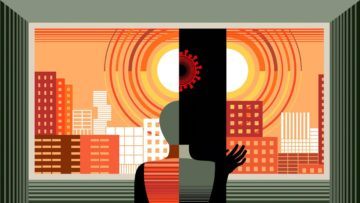Catherine Nixey in MIL:
 I’d been looking forward to the meal for weeks. I already knew what I was going to eat: the rosemary crostini starter, then the lamb with courgette fries. Or maybe the cod. I planned to arrive early and sit in the window at the cool marble counter and watch London go by. In the warm bustle of the restaurant, the condensation would mist the pane. As a treat, I would order myself a glass of white wine while I waited for my friend. It won’t surprise you to hear that the meal never happened. Coronavirus cases started rising exponentially and eating out felt less like indulgence and more like lunacy. Then it became illegal to eat together at all. Soon it became illegal even to eat at a restaurant by yourself. Then everything shut.
I’d been looking forward to the meal for weeks. I already knew what I was going to eat: the rosemary crostini starter, then the lamb with courgette fries. Or maybe the cod. I planned to arrive early and sit in the window at the cool marble counter and watch London go by. In the warm bustle of the restaurant, the condensation would mist the pane. As a treat, I would order myself a glass of white wine while I waited for my friend. It won’t surprise you to hear that the meal never happened. Coronavirus cases started rising exponentially and eating out felt less like indulgence and more like lunacy. Then it became illegal to eat together at all. Soon it became illegal even to eat at a restaurant by yourself. Then everything shut.
The cost of these lost lunches has been totted up many times: the trains not taken, the taxis not flagged down, the desserts not eaten, the waiters not tipped. Then there is the emotional toll, too. Spirits are flagging, the lonely are getting lonelier, the world is wilting. Covid has already disrupted so much of how we live. It has altered something else, as well – time itself. Not so long ago, we had merely months and years. Things happened in November or in December, last year or this. Some events are so big that they divide the world into before and after, into the present and an increasingly alien past. Wars do this, and the pandemic has, too. Coronavirus has cut a trench through time.
The very recent past is suddenly another country. Now, amateur archaeologists of our own existence, we sort through our possessions and stumble on small relics from “then”, that strange place we used to live: a bus pass, a lipstick, a smart watch, a pair of shoes with the heels worn down, work clothes that, after just six months in stretchy active-wear, feel as stiff and preposterous as whalebone.
More here.
